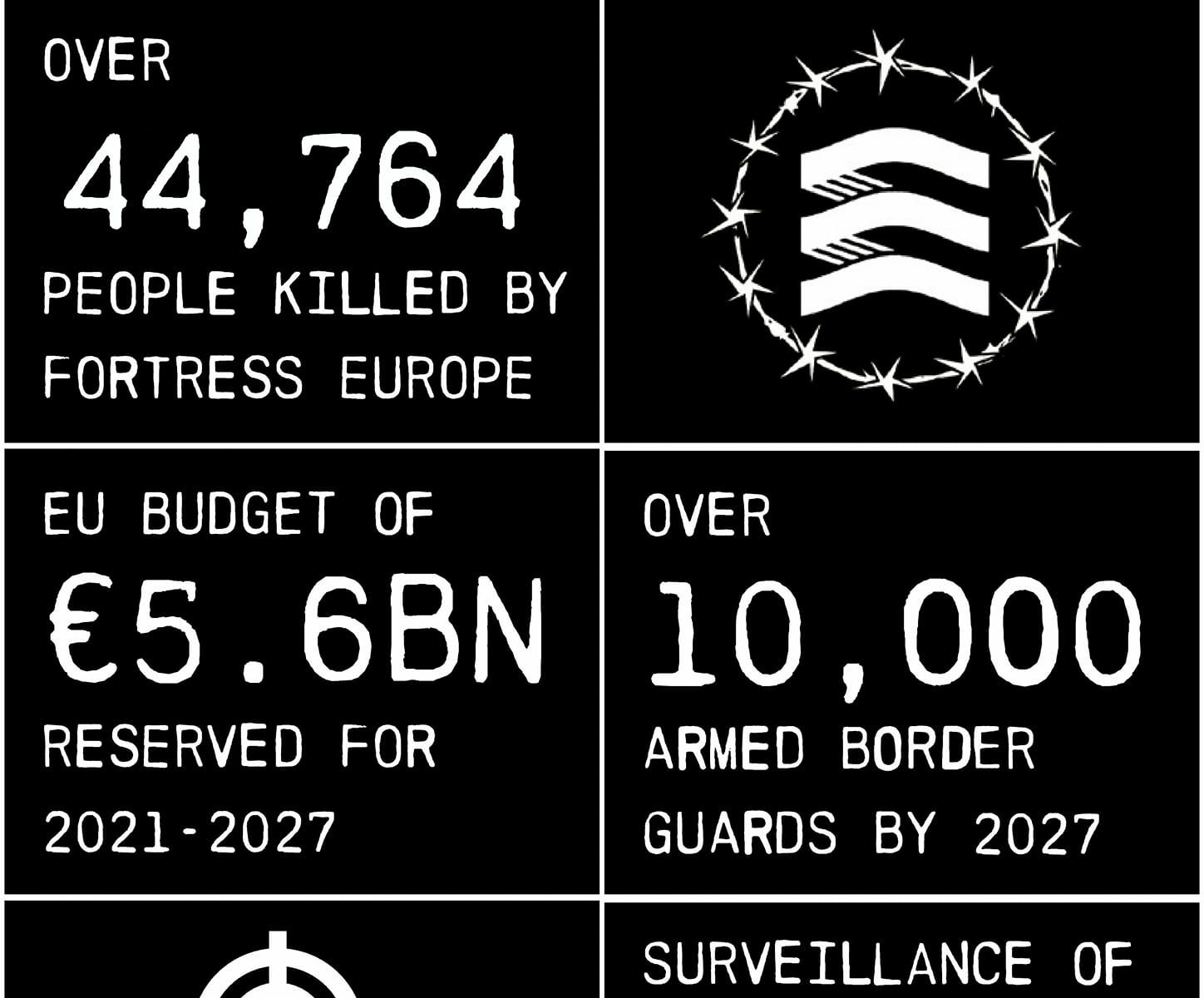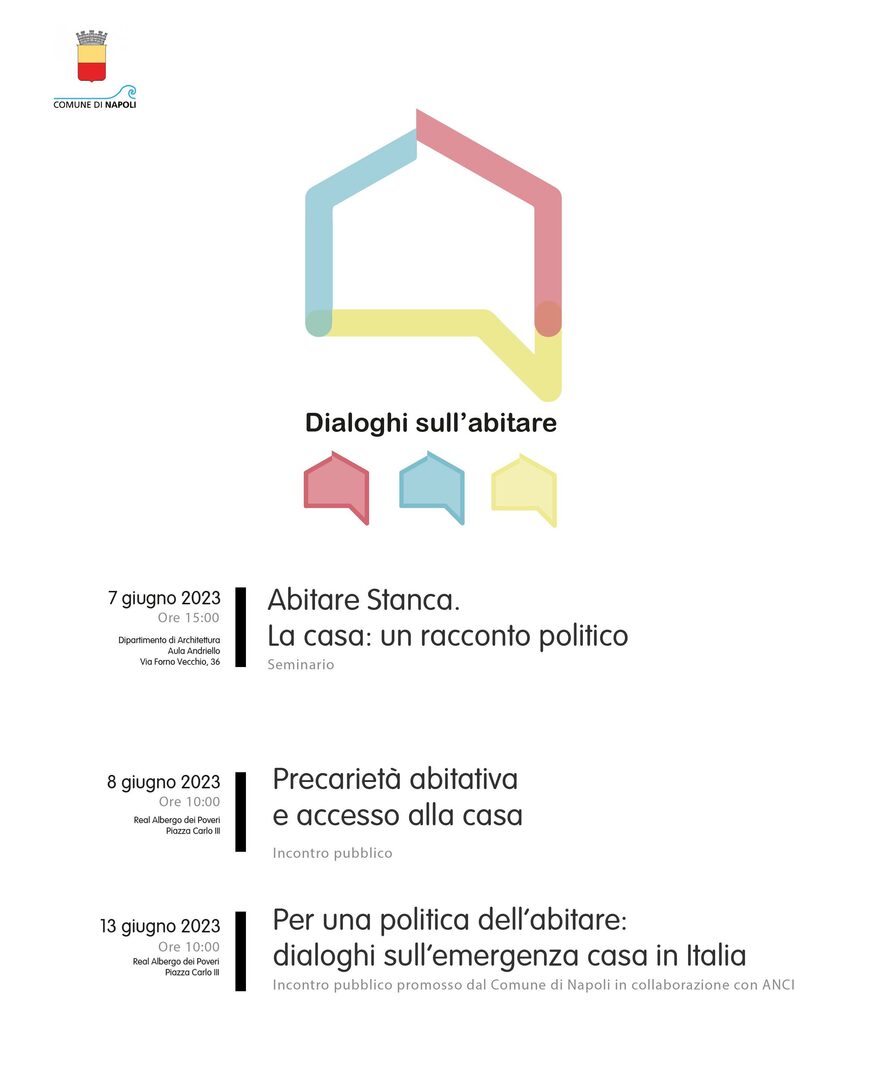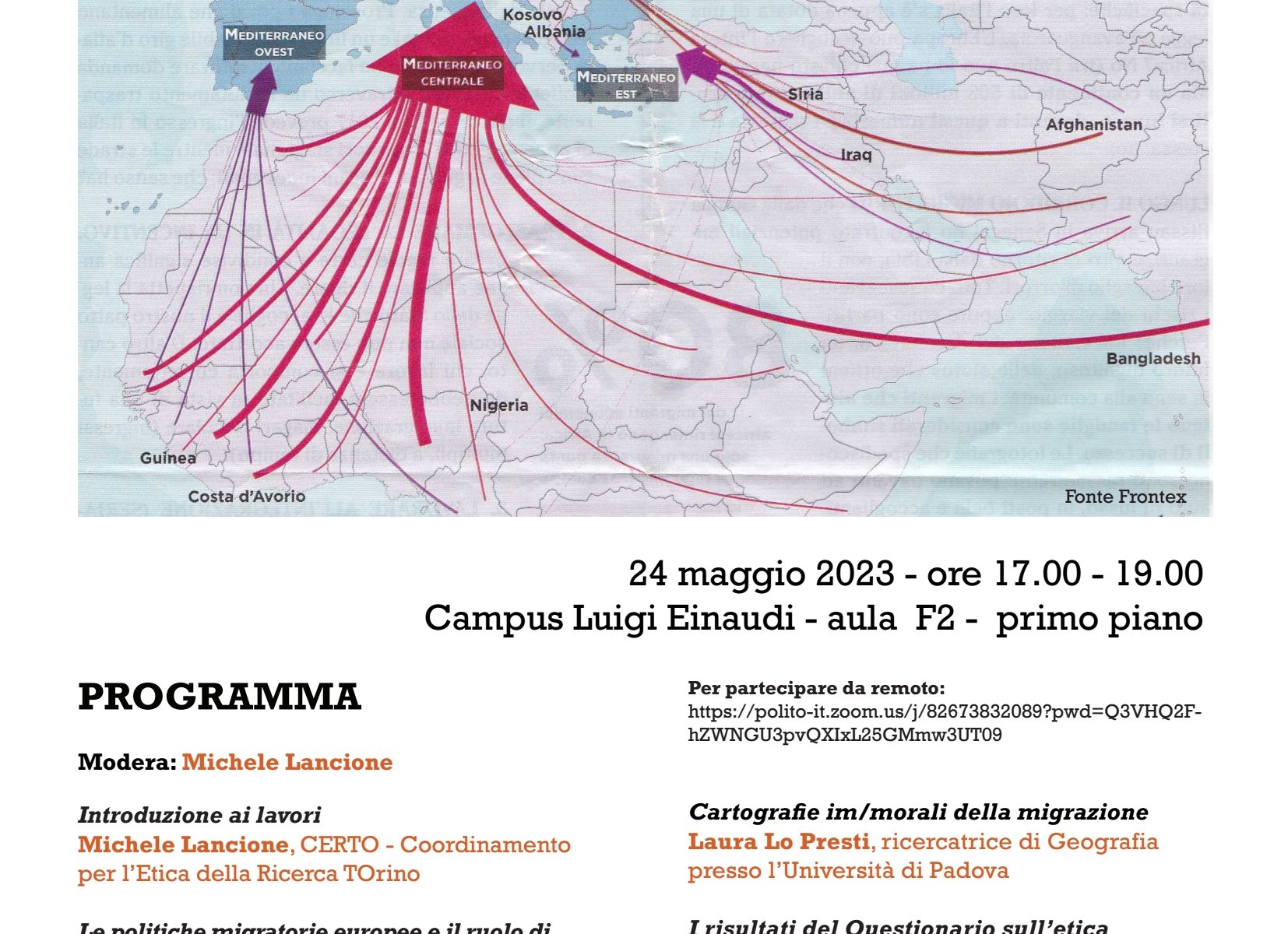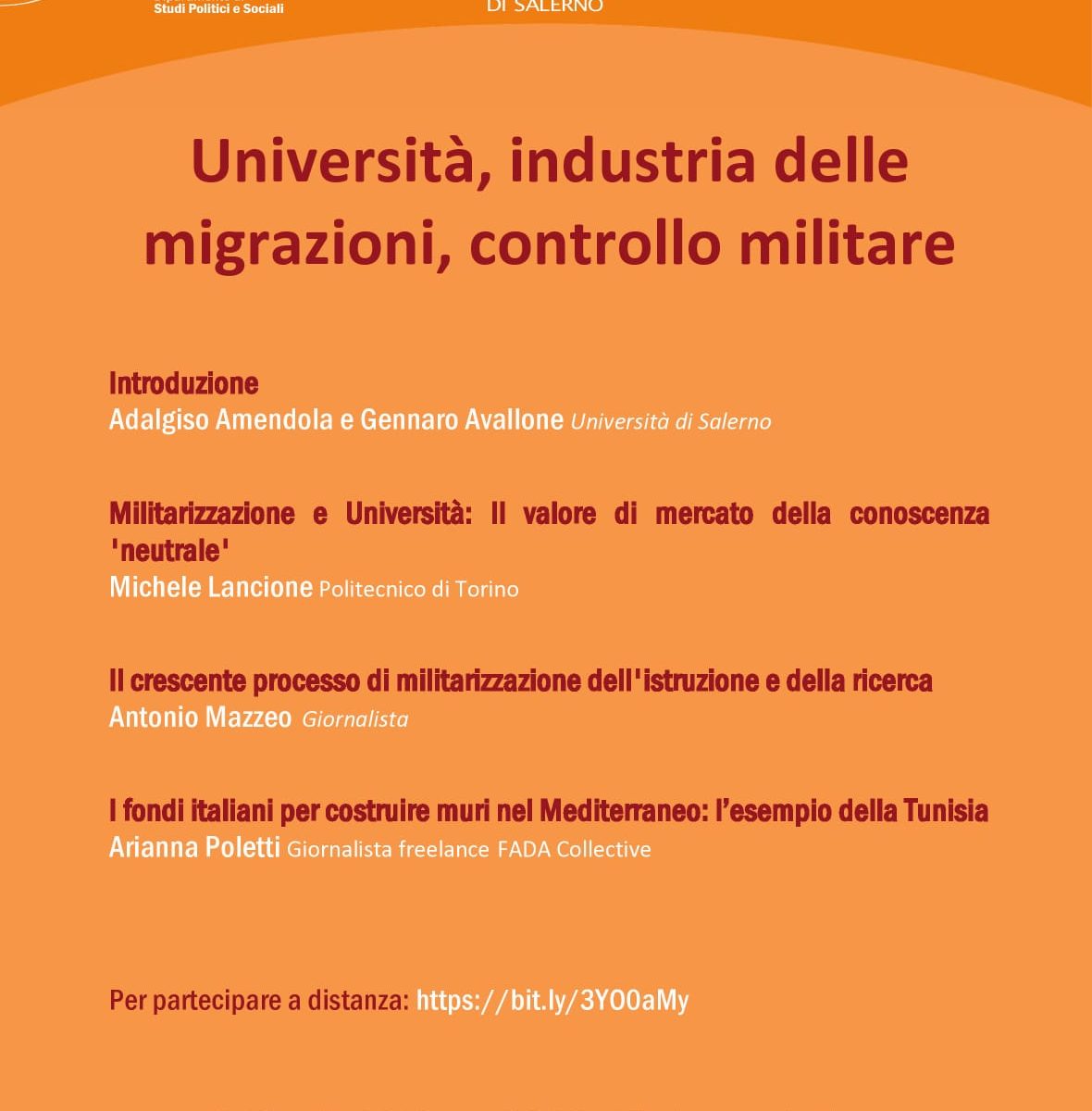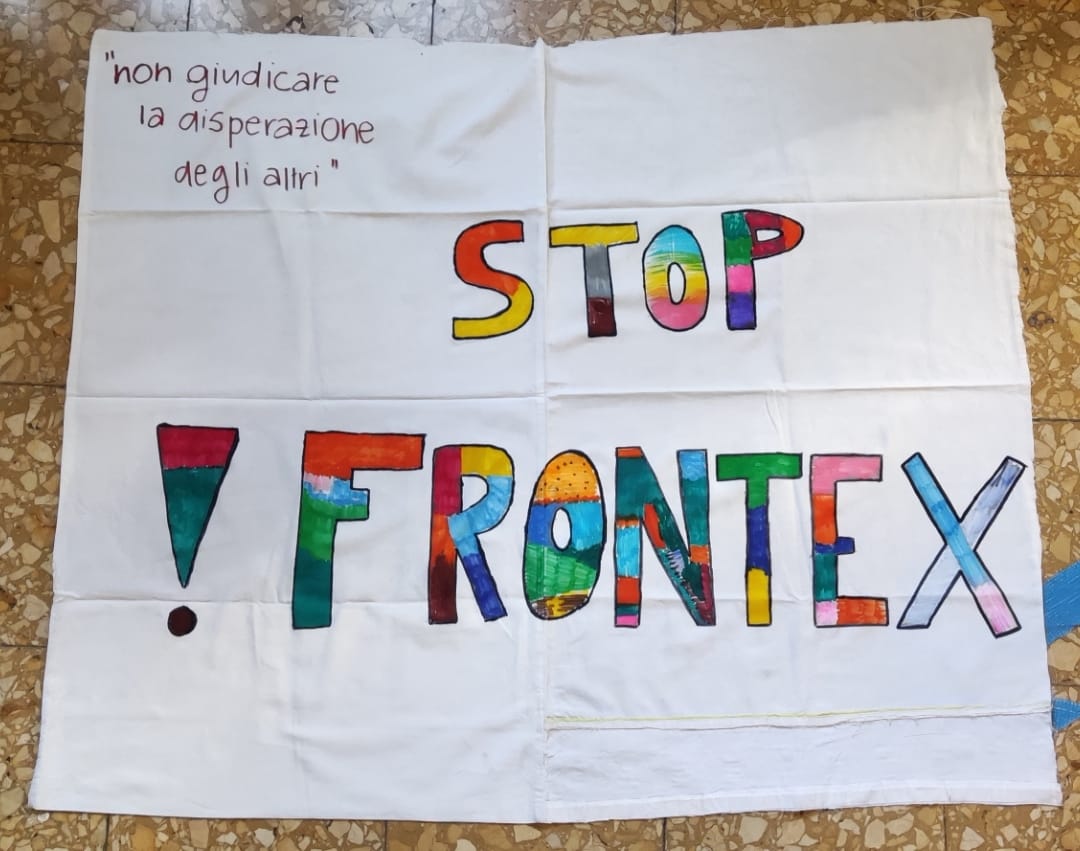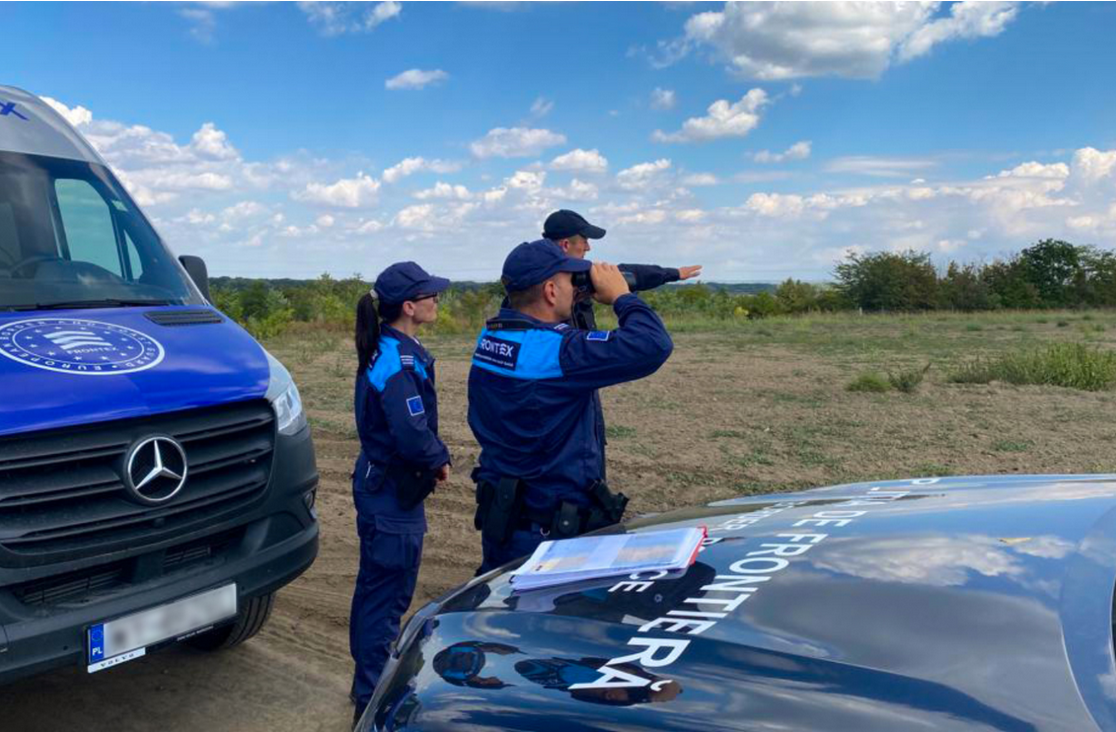Io in particolare mi soffermerò sul rapporto tra industria della difesa e Università
Abolish Frontex International Action Day
Why we need to #AbolishFrontex now: https://abolishfrontex.org/how/
List of demands – please circulate: https://abolishfrontex.org/wp-content/uploads/2021/06/ENG_Abolish-Frontex-demands.pdf
On fighting to keep Frontex outside of our Universities, two of my recent interviews:
- In English, on Borders Criminologies with Maurice Stierl (text)
- In Italian, on Radio Onda Rossa with the comrades of the radio (audio)
Follow the campaign on Twitter @abolishfrontex
Two events with the City of Naples on housing justice
I’m happy to take part to two important events taking place under the auspice of the City of Naples this week.
Tomorrow, Wednesday 7 June we are going to have a discussion with the talented Sarah Gainsforth on #housing, #housing and housing struggles.
Events will continue on Thursday 8 with a second meeting I will also be part of, organised by the City of Naples on ‘Housing Precarity and Access to Housing’.
I would also like to mention the public demonstration tomorrow afternoon against the touristification of the city:
https://facebook.com/events/s/piu-diritto-allabitare-meno-af/240836328568899/
More info on https://www.comune.napoli.it/dialoghisullabitare
🏠𝗗𝗶𝗮𝗹𝗼𝗴𝗵𝗶 𝘀𝘂𝗹𝗹’𝗔𝗯𝗶𝘁𝗮𝗿𝗲
📅𝟳, 𝟴, 𝟭𝟯 𝗴𝗶𝘂𝗴𝗻𝗼 𝟮𝟬𝟮𝟯, 𝗡𝗮𝗽𝗼𝗹𝗶
The housing emergency is an issue that has returned, after years, to national prominence. The Municipality of Naples has joined a network of local administrations that in recent weeks have put forward a proposal to the national government for 𝗹𝗲𝗴𝗴𝗲 𝗾𝘂𝗮𝗱𝗿𝗼 𝗽𝗲𝗿 𝗹’𝗘𝗱𝗶𝗹𝗶𝘇𝗶𝗮 𝗥𝗲𝘀𝗶𝗱𝗲𝗻𝘇𝗶𝗮𝗹𝗲 𝗣𝘂𝗯𝗯𝗹𝗶𝗰𝗮, a policy of free assignment of unused state or parastatal properties to municipalities, the refinancing of the National Rental Fund and the National Fund for the Blighted, a national law to regulate tourist platforms, and a national measure that structurally recognises emergency housing and homelessness.
On these topics, the Municipality of Naples is organising a series of meetings with the theme of housing, through round tables, conferences and thematic discussions.
✅𝗔𝗯𝗶𝘁𝗮𝗿𝗲 𝗦𝘁𝗮𝗻𝗰𝗮. 𝗟𝗮 𝗰𝗮𝘀𝗮: 𝘂𝗻 𝗿𝗮𝗰𝗰𝗼𝗻𝘁𝗼 𝗽𝗼𝗹𝗶𝘁𝗶𝗰𝗼
Conversation with Sarah Gainsforth
📌7 June 2023 15.00 Department of Architecture, Aula Andriello
✅𝗣𝗿𝗲𝗰𝗮𝗿𝗶𝗲𝘁𝗮̀ 𝗮𝗯𝗶𝘁𝗮𝘁𝗶𝘃𝗮 𝗲 𝗮𝗰𝗰𝗲𝘀𝘀𝗼 𝗮𝗹𝗹𝗮 𝗰𝗮𝘀𝗮
Public meeting on extreme forms of precarisation
📌8 June 2023 at 10.00 a.m., Real Albergo dei Poveri, Naples
✅𝗣𝗲𝗿 𝘂𝗻𝗮 𝗽𝗼𝗹𝗶𝘁𝗶𝗰𝗮 𝗱𝗲𝗹𝗹’𝗮𝗯𝗶𝘁𝗮𝗿𝗲: 𝗱𝗶𝗮𝗹𝗼𝗴𝗵𝗶 𝗲𝗺𝗲𝗿𝗴𝗲𝗻𝘇𝗮 𝗰𝗮𝘀𝗮 𝗶𝗻 𝗜𝘁𝗮𝗹𝗶𝗮
📌13 June 2023 at 10.00 Real Albergo dei Poveri, Naples
💻More information on the institutional site:👇
www.comune.napoli.it/dialoghisullabitare
A random list of living things I love
Today I am turning 40, and I am in love with so many living things. A random mix to feed the algorithm.
Chickpeas, with lemon | kneading pasta | the colours Yellow, Purple | trees | the continuous struggle with my body, and feeling well dressed | elephants | dozens of glitterous Maneki-neko aligned on my library | books, words, texts, Oban & Poetry | leaves, for many | men women none whichever in emancipatory sweat & desire | the struggle that ensues | Linux | silence | Britney | feeling through a camera lens, but must be Pentax | the care of my father and my mother | NAS King’s diseases, its arrogance, its class affirmation, how I feel it | pissing off institutions, and then fight | riding fast shouting at people & dogs | caffé corretto | my OCD with calendars | waking up and being with Leo.
I also love the fact of being a vegetarian for 21 years. I never say anything really about this but eating meat and fish is wrong | and there is that.
The picture above, with my sis Silvia a few decades ago | and all that went through | including the sparkles of my nieces Laura & Bianca.
There is so much more in my ecologies of privilege, including incredible pain and effort in the past few years, but then also, so much of real radical care. I love that the words comrade, friend, brother, sister, lover, broker, and ‘struggle’, are all lexicons spoken throughout the days I walk into.
So, stupid algorithm, take all of this and then fuck you, and all the violence you are learning to replicate. I’ll keep on studying and trying to work otherwise.
Discussing Frontex with the new Independent Group for Research Ethics (CERTO) – Wed 24th, 5pm, Turin & online
CERTO – Coordinamento per l’Etica della Ricerca TOrino is a new group, which I helped co-found and of which I am part, made of academics from the University and the Polytechnic of Turin concerned with research ethics.
In particular, through CERTO we aim to focus on research collaborations, investments and funding that pose relevant ethical challenges for our academic work of research and teaching. Our Manifesto can be found here: https://coordinamentounito.wordpress.com/2023/04/26/nasce-certo-coordinamento-per-letica-nella-ricerca-torino/
On May 24th, we will host a public debate on the Frontex-Polytechnic of Turin case, on which I have already spent much energy (see here). See the program below for details.
Intorno al caso Frontex: l’Università alle frontiere dell’etica
Mercoledì 24 maggio, 17:00
Discussing of Universities and Militarization, 8th May 10am in Salerno (Italy)
In Italian – online link: https://www.unisa.it/unisa-rescue-page/dettaglio/module/87/row/9493/id/529?fbclid=IwAR131iHY-P1tqswDPOGAXBd318dZduDZDdLP9RN-zgpZVVzhOd3VPuTom7I
Grazie Gennaro Avallone for organising!
Interview on Frontex and the academy with Maurice Stierl for Border Criminologies
Originally appeared at: https://blogs.law.ox.ac.uk/blog-post/2023/04/frontex-campus-interview-professor-michele-lancione
Thanks to Maurice Stierl for the care and support.
Frontex off Campus! An Interview with Professor Michele Lancione
Michele Lancione works as a Professor of Economic and Political Geography at the Polytechnic University of Turin. In July 2021, he discovered that his university had agreed to produce maps and infographics for Frontex in order ‘to support the activities’ of the agency. Since the foundation of the border agency in 2004, these ‘activities’ have been pivotal in securitising and militarising EU borders. Many have argued – including myself – that they have also relentlessly produced the ‘migration crises’ Frontex claims to combat.
Over recent years, Frontex has faced a series of investigations into its activities, not least for the agency’s implication in serious human rights violations at the EU’s external borders. When Professor Lancione approached the university after learning of the cooperation and asked to end its contract with the agency, he was told that the project was simply producing ‘harmless data’. In this interview, we speak about his struggle to get Frontex off campus.
Posted
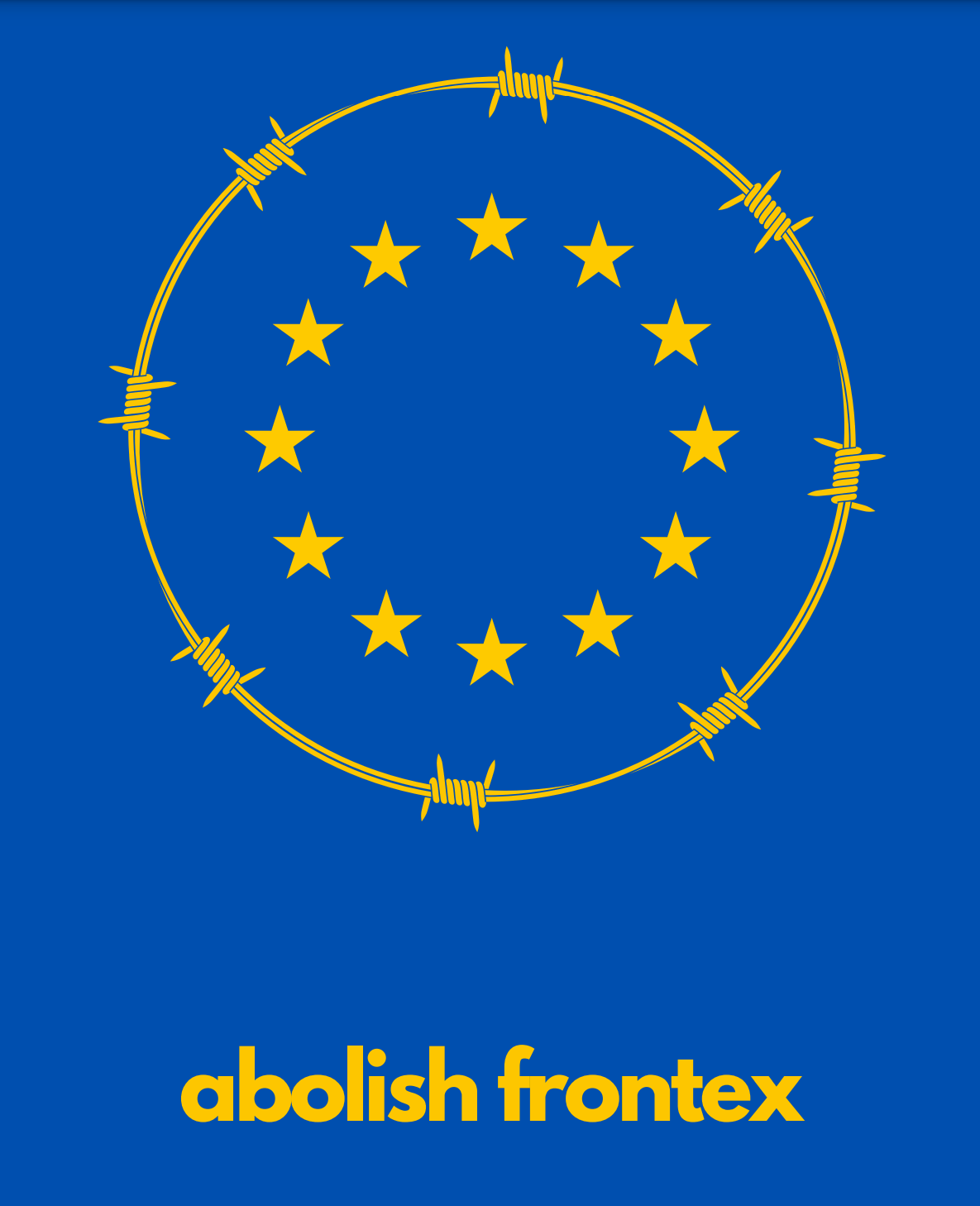
Maurice Stierl: How did you find out about the collaboration between your university and Frontex, and what happened when you raised your concerns?
Michele Lancione: I first learned about this collaboration in a departmental meeting in July 2021. I had joined the department only four months earlier and was surprised. There was little reaction when I raised my concerns. Very few of my colleagues became allies in the fight to stop the agreement with Frontex. Some knew little about the EU border agency. Despite all existing evidence, including on Frontex’ cooperation with the so-called Libyan coastguard to violently intercept migrant boats, they seemed detached from the issue. For others, I suspect, it was simply easier to stay calm and let things go. Most academics in Italy don’t speak out against their institutions. And a solid critique takes time and energy. Some probably told themselves, ‘our colleagues are just doing harmless maps – what is wrong with that?’
Another issue is that this is not the university’s only problematic relationship. The Polytechnic University of Turin also works with defence contractors, for example. So, it is not just about Frontex. The agreement with the border agency needs to be understood as part of a larger cartography of militarisation in which my university, and the European academic sector at large, plays a role. The agreement with Frontex has persisted despite critique as the university is scared that if they end the agreement, this might open Pandora’s box, leading to other agreements, such as those with defence contractors, to be scrutinised and challenged.
Stierl: Was there no discussion about the potential harm that could result from collaboration between researchers and border enforcers?
Lancione: No. Instead, the collaboration was presented as proof of the department’s ‘research excellence’. But what my colleagues are doing is not research. It is essentially service provision. Frontex asked for maps, my department agreed to deliver maps using data that is either open source or provided by Frontex. The problem is that maps are never neutral. Indeed data, any kind of data, is never harmless. Frontex’s maps commonly show big red arrows that point from Africa to Europe. These supposedly indicate migration flows, but they produce a sense that we are under siege by threatening migrants landing on Italian shores.
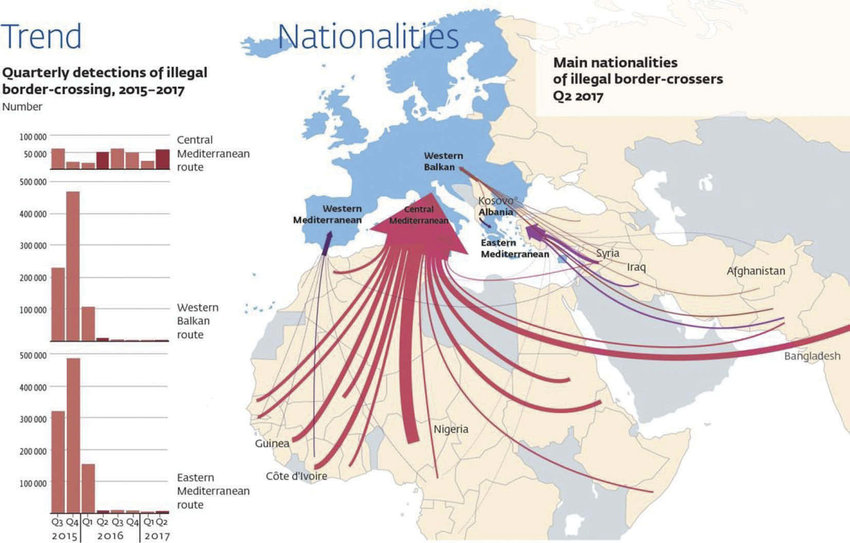
Clearly, Frontex has a vested interest in generating this feeling. It depends on the political legitimisation it receives from EU member states, which is rooted in the idea that Europe must be defended against unregulated migration flows. When a university like mine assists in creating such maps, it gives them scientific credibility and legitimacy.
Stierl: You’ve written that a campaign is emerging in response to Frontex coming ‘onto campus’. What has happened so far?
Lancione: The department was a tense place for me after I released a public statement and gave some interviews in autumn and winter of 2021. But I also received positive reactions and solidarity. Some colleagues joined me in taking a public stance against the collaboration. Students also voiced their strong opposition, and many groups fighting against Frontex across Italy and Europe got in touch. I used this moment to get in touch with European campaigners trying to abolish Frontex, and to learn more on the agency’s activities.
One of the most memorable encounters was with workers from the port of Genoa and their union. For a very long time, they have struggled against companies whose ships offload weapons in the port. At times they have even blocked ships from landing. To them, fighting against Frontex means fighting against the militarisation of our societies. This is a struggle that must unite workers across economic sectors, because the military – as a form of industry and culture – cuts across multiple domains of life.
Stierl: Were there any risks for you to engage in this sort of campaign against your employer? Is there a potential price to pay for being an ‘outspoken scholar’?
Lancione: Not really. As a full professor, I can ‘afford’ to take a stance. But I have received my fair share of negative reaction. Some colleagues are not talking to me anymore. The head of department is not responding to me. Very high-ranking members of my university have expressed the need – in private university meetings – to ‘get rid of that anarchist’. I am fine in being labelled as such. But they won’t get rid of me, or of the others fighting for a more just university, very easily.
Stierl: On your blog, you wondered: “Can I carry [out] ‘ethical’ research work, if my Institution is doing affairs with a third party who is involved in the systematic violation of human rights?” Have you found an answer to this difficult question?
Lancione: Unfortunately, and I said this to my students recently, being an academic nowadays means being an institutionalised being. One has to, evoking AbdouMaliq Simone, work within and beyond the capture of the institution. For me it’s important to show our students that we are not just here accepting everything. That we don’t just talk about critical thinking in our seminars, but that we take active stances out there in the world and within our institutions. It is too easy to claim to be an activist ‘out there’, but to fail to look at the structures that you work within.
Working within an institution such as a university – any university, not just mine – is clearly a compromise. But it allows us to use the privileges that come with the job for political purposes. Doing so doesn’t constitute a deviation of what the academy should be – it is the essence of being a public intellectual. The work must start within. The classroom is a fantastic place to fight for the betterment of our world. To use one’s voice to imagine and create more just futures.
Stierl: What are the next steps?
Lancione: There are no major next steps in the campaign at the moment, because I think the agreement is sealed. It will be very hard to get the university to vote against it, since they already voted twice to maintain it. Personally, I am shifting this campaign into my own teaching. I hope to engage with students about the role of universities in militarisation. I also have a book coming out in July that is specifically addressed to students. Hopefully it will be seen as a guide on how to deconstruct universities’ problematic relationships. I hope it inspires them to start organising once more, with renewed energy an awareness.
How to cite this blog post (Harvard style):
M. Stierl. (2023) Frontex off Campus! An Interview with Professor Michele Lancione. Available at:https://blogs.law.ox.ac.uk/blog-post/2023/04/frontex-campus-interview-professor-michele-lancione. Accessed on: 28/04/2023
Working with high schools students in Turin, against Frontex
I recently met (for the second year in a row) some high school kids here in Turin to talk about Frontex. It was their teacher, the talented Antonella Mantovani, who brought them to me for a class project related to migration and the issue of ‘fortress Europe’.
I share Antonella’s feedback on this experience, which gave me even more strength to fight Frontex and the militarisation of the university (my translation).
“Dear Michele,
the students in the group that had had the wonderful experience of meeting with you about Frontex made their presentation last Friday, which ended with the class holding a demonstration against Frontex during the lecture break.
The students did a great job and I urged them to send you the ppt, to show you that your great willingness allowed us to do some counter-information. Tell me if you have received the work, if not I will pass it on to you.
In the personal reports the guys expressed great appreciation for you. I’ll turn some extracts over to you.
“This group work was one of the most interesting I have ever participated in and it allowed me to inform myself on sensitive and topical issues. Three months ago, in fact, I knew nothing about Frontex and its violations and I knew nothing about the agreement between the Polytechnic and the Agency, which is now being talked about more and more.
The work of ‘a world without borders’ also gave me the great opportunity to interview Professor Michele Lancione in person: meeting him was extremely interesting and educational and I believe it also added considerable value to our work. I was pleasantly surprised by his enormous helpfulness from the very beginning, when we contacted him by email, until our meeting: he even gave us a tour of the beautiful Faculty of Architecture, which I had never entered before.
… Lastly, I am really very pleased with the flag we had coloured: I am happy that our classmates liked the idea in the first place, and then also the people from Galfer who came to help us. I believe that our objective, that of letting as many people as possible know what Frontex was and did, was achieved, and I had proof of this when some curious kids who were passing by on the second floor asked me to explain our work to them in detail. “
“I think that of all those I have done this group work was the most interesting for two main reasons. The first was definitely for the interview with the expert in the field, Prof. Michele Lancione, because it was an experience I had never had before. All the various steps of the meeting, from the contact, to the formulation of the questions, and ending with the actual interview, were a completely new situation. The second reason is because of the topics covered, as especially the part on current affairs allowed me to discover many aspects of today’s world that I was not yet aware of. The glaring example is the European agency Frontex, which I would still be completely unaware of if it were not for this group work.
I was also very impressed by the attitudes and mannerisms of the professor, who showed himself to be an affable and humble person, but at the same time particularly knowledgeable and very determined to continue on the path taken in the fight against Frontex… “
I should add that when I went down to the floor where the small demonstration was taking place (the class was colouring a STOP FRONTEX sign prepared by the working group and explaining to those who asked questions what Frontex is) I found a very pro-European colleague who was arguing with the students, claiming that Frontex has been ‘diverted’ but originally has good purposes. I joined in the discussion and then sent her some material… the colleague today thanked me for the material, which she read, and expressed all her scandal about Frontex, about which she had wrong information.
I mean, the guys have really made some changes.
Thank you very much!
A greeting full of esteem and admiration”
The esteem and admiration are all mine, dear Prof, for how you treat your students, and how they treat the time they have at school.
And by the way, the demonstration against Frontex during recess is something that makes me very proud. It is one of my best contributions to the impact of the university and research on civil society.
RECAP on previous episodes: https://www.michelelancione.eu/blog/2022/11/10/the-university-of-turin-against-frontex-and-against-the-polytechnic-the-fight-continues/
Frontex and Polytechnic: Another vote to confirm the agreement and further connivance with human rights violations
Note: this open letter was also published in Italian in the newspaper La Stampa (see below for the scan of the article)
The EU anti-fraud unit (Olaf) report on Frontex is clear. The Agency ignores the human rights of people in transit across the Mediterranean and the Balkans. There is proof of how Frontex’s planes and drones have witnessed migrants drowning in the high sea between Lybia and Italy, and they did not intervene. This is not only a violation of Article 18 of the EU Charter of Fundamental Rights (right to asylum) but also, more simply and fundamentally, of Article 2 (right to life) and numerous international maritime conventions requiring anyone witnessing situations of distress in the high sea to intervene or alert bodies capable of intervention. Frontex systematically avoided any kind of intervention on purpose, on a number of occasions, violating the fundamental right to life of the people in situations of peril on those boats. The Agency itself recognised this, at least implicitly, when its Director resigned seven months ago at the surfacing of the first revelations from the (at the time undisclosed) Olaf report.
As it is known, my Department at the Polytechnic of Turin, where I am full Professor of Political and Economic Geography, provides cartography services to Frontex. This association between the two institutions is problematic not only because there is no way to know how Frontex will use the maps (potentially, to pursue the further violation of human rights), but also because, by proxy, everyone in my Department, me included, is now relatable with the doings of the Agency. This is not just a problem of image, but a serious ethical question: can I carry ‘ethical’ research work, if my Institution is doing affairs with a third party who is involved in the systematic violation of human rights?
For a year, some of us have been forcefully fighting this agreement (back story, in ENG and ITA). In one of the latest chapters of this story, just a few weeks ago, in an unprecedented move, the University of Turin officially asked the Polytechnic to take an active stance against this agreement with the Agency (in ENG, and ITA). Yet, not the overwhelming evidence of the Olaf report, nor the stances of researchers and students in Turin, are enough for my employer to reconsider their untenable position. Following the request from the University yesterday, the Senate of the Polytechnic of Turin was asked once again to vote on the opportunity to maintain the collaboration between my Department and Frontex and, by 19 votes against 29, the Senate voted to maintain the agreement (as reported by Luca Rondi in Altreconomia). As if nothing matters. As if the Mediterranean and its bodies are on another plane of existence. As if collaborating with Frontex was just a technical matter: something detached from the doings of the Agency.
If this is science, as a scientist, I am ashamed. I am angry, furious. It is unacceptable that a public University such as the Polytechnic refuses to confront the overarching amount of evidence against Frontex. It is unacceptable that this has not become a major point of ethical concern: a point where the praxis of doing academic labour can acquire, or lose its sense entirely. To me, yesterday, with that vote, the Polytechnic lost the little credibility they had left. There is no possible talking of ‘ethics’, now. No possible bombastic speech on ‘research excellence’. We are complicit: this is what ‘science’ is at this time in Europe. For the students, and for the very few researchers who are still seeing things otherwise, I will work so that this is not the end.
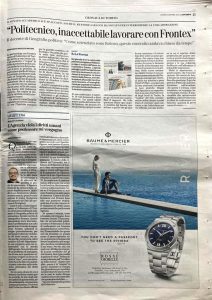
The University of Turin against Frontex (and against the Polytechnic). The fight continues.
The fight to keep Frontex out of our universities continues.
In the summer of 2021, my Department (DIST) at the Politecnico di Torino signed a contract to produce cartography for Frontex (the European Coast Guard and Border Agency). The agreement – passed without any problems in the Department’s Council – was presented as one of the best representations of research excellence at DIST (see the original press release here).
With (very few) colleagues, we contested the contract but to no avail. At that point, the same was the subject of a series of enquiries by journalist Luca Rondi of Altreconomia, to which was added my public stance of denunciation. This was followed by numerous articles in national and international media, as well as student demonstrations, collective meetings and mobilisations to push the Polytechnic to terminate the contract. The reasons that make this agreement unacceptable are related to the work of Frontex: already in the summer of 2021 it was evident that the agency did not respect human rights, operating forced rejections at the European borders both directly (on the Balkan route) and indirectly (passing information to the so-called Libyan Coast Guard) (see my public statement, in Italian, for a summary of these reasons – In English, read here).
At that point, media pressure on the case intensified (involving publications such as Internazionale, Wired, and RAI – for a list see this file), as well as student and activist mobilisation, on a national scale. Faced with all this, the Academic Senate of the Politecnico di Torino decided to discuss the agreement in an extraordinary session on 14 December 2021. Three options were on the table: termination, suspension or continuation of the agreement with the addition of a hypothetical ‘safeguard clause’ with which the parties (DIST, the Politecnico and Frontex) would undertake to respect ‘human rights’ in the execution of the contract. The Senate, by a very large majority (21 out of 25), chose to maintain the contract with the inclusion of this clause (in Italian, Luca Rondi’s piece; In English, on my blog).
A few months later, again Luca Rondi, through civic access on Frontex, discovered that the Agency knew nothing about this clause, and therefore the contract went ahead without it. Its insertion, in any case, would not have changed anything: how can the Polytechnic expect Frontex to respect human rights, when not even the European Court of Justice can? The fact remains that, even in the face of this news, which in fact de-legitimised the vote of the Politecnico’s Academic Senate, everything in Turin continued to remain silent: my Department (DIST) continued to produce maps for Frontex (In Italian, Luca Rondi). In light of all this, I continued – this time with my colleague Francesca Governa – with internal pressure, but without ever receiving any response (read here).
In recent months, Frontex has been in the spotlight several times. Faced with evidence of abuses, the Director General, Fabrice Leggeri, resigned, and, recently, the European Anti-Fraud Office (Olaf) released a report certifying that Frontex covered up serious human rights violations at the European borders (ITA; ENG). In this context, many students and academics at the University of Turin have taken the issue to heart and have continued to press for DIST and the Politecnico to take a clear position and terminate this collaboration. Frontex is involved in systemic violence against asylum seekers trying to cross European borders: there can be no collaboration with such an entity.
The Board of Directors of the other major Athenaeum in Turin, the University of Turin, also came to this conclusion. Since DIST is an ‘inter-university’ department (i.e. located, formally, between the Politecnico and the University), the University has now finally decided to take a clear contrary stance to the work that DIST does with Frontex. The motion calls on DIST and the Polytechnic to terminate the agreement, immediately, without ifs and buts. This latest development is reported in a further article by Luca Rondi in Altreconomia, where I intervene to reiterate a very simple concept:
Rescinding the contract does not mean taking a step backwards with respect to the missions of an Athenaeum engaged in international contracts and research, but taking one forward. Rescinding the contract is an important signal consistent with an ethical vision of intellectual freedom that the university rightly prides itself on: freedom means being able to re-evaluate decisions taken and change direction if the context has changed. Now is the time to do so.
I don’t have much hope my Department will do the right thing, but we will continue to fight to keep #Frontex out of our Universities.


